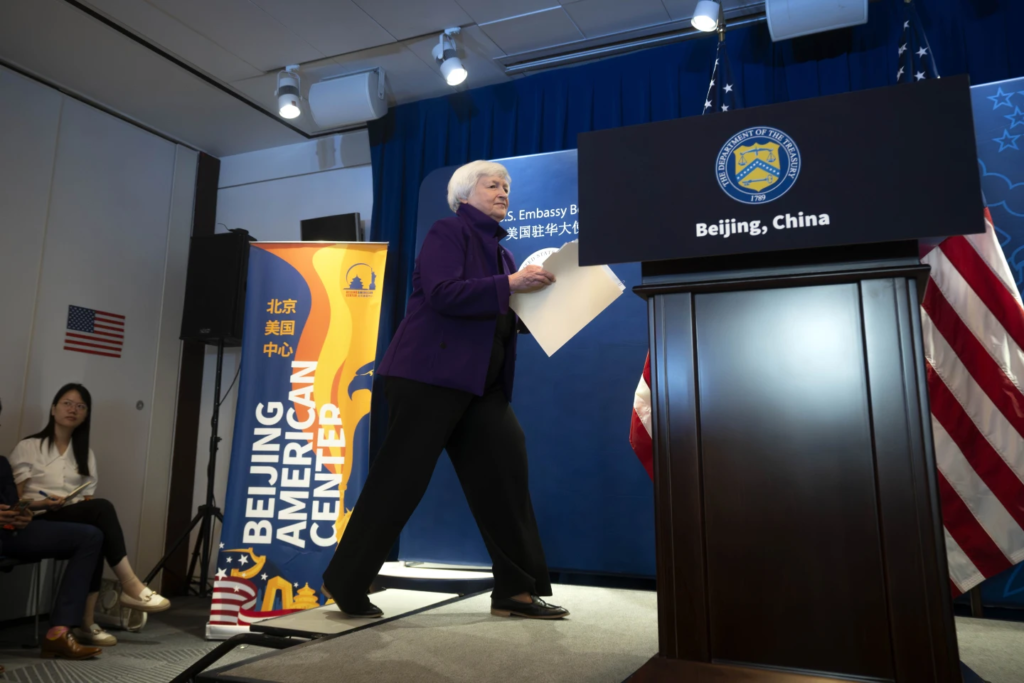BEIJING (AP) — In a bid to mend strained relations, Treasury Secretary Janet Yellen concluded her visit to Beijing on Sunday, expressing willingness to address Chinese concerns regarding security-related restrictions on U.S. technology exports. Yellen acknowledged the need to consider and potentially respond to unintended consequences arising from these measures.
Yellen defended the implementation of “targeted measures” in trade, which have drawn complaints from Chinese leaders who believe they are designed to undermine the growth of their nascent tech sectors. While the Biden administration aims to avoid unnecessary fallout, Yellen did not provide any specific indications of potential changes.
The ongoing disputes over technology, security, and other contentious issues have led to a significant deterioration in relations between the world’s two largest economies. One of China’s main grievances is the restricted access to processor chips and other U.S. technologies on national security grounds, which poses a threat to the ruling Communist Party’s ambitions in areas such as smartphones, artificial intelligence, and other key industries.
“We will establish channels through which they can express their concerns about our actions, and we can provide explanations and, in certain cases, address unintended consequences resulting from our actions,” Yellen stated during a press conference.
During her visit, Yellen engaged in discussions with China’s second-ranking official, Premier Li Qiang, as well as other officials, spanning over 10 hours of meetings. Additionally, she held a five-hour session on Saturday with Vice Premier He Lifeng, her Chinese counterpart. Notably, there were no plans for Yellen to meet with Chinese leader Xi Jinping, as stated by Treasury officials in advance.
Yellen received a warm reception and gained significant coverage in the state media. However, Chinese officials did not indicate any intention to modify their industrial or other policies, which have been criticized by Washington and other governments for violating Beijing’s free-trade commitments. He, on Saturday, called for a “rational and pragmatic attitude” from Washington to improve bilateral relations.
While no major agreements or plans for future activities were announced on Sunday, Yellen emphasized that her department and Chinese officials would engage in “more frequent and regular” communication.
The political tensions between the United States and China are contributing to uncertainties that are dampening consumer and business confidence, affecting spending and investment.
Following the lifting of anti-virus measures on travel and business activities in December, China’s economic growth rebounded to 4.5% in the first quarter of 2023 from the previous year’s 3%. However, both factory activity and consumer spending decelerated in the quarter ending in June.
In March, President Xi accused Washington of attempting to hinder China’s industrial development.
Beijing has shown reluctance to retaliate swiftly against U.S. technology restrictions, likely to avoid disrupting its own industries. However, three days prior to Yellen’s visit, the Chinese government announced unspecified controls on the exports of gallium and germanium, metals crucial for semiconductor and solar panel production. China is the largest producer of both metals.
Yellen stated that she aimed to reassure Chinese officials that Washington does not seek to decouple or separate its economy from China, but rather aims to “de-risk” trade.
The Biden administration is urging semiconductor manufacturers to relocate their production to the United States in order to reduce reliance on Taiwan and other Asian suppliers, which is seen as a security concern. Additionally, the U.S. seeks to develop alternatives to Chinese supplies of rare earth elements, metals essential for smartphones, wind turbines, and other products.
“They have expressed some concern that de-risking amounts to decoupling,” Yellen acknowledged. She attempted to convey to her Chinese counterparts that these two concepts are not synonymous. Yellen clarified that de-risking involves addressing explicitly articulated and narrowly focused national security concerns, as well as a broader objective of diversifying supply chains, which the United States is actively pursuing in specific sectors.
Throughout her visit, Yellen emphasized the importance of “healthy economic competition,” alluding to concerns that Beijing violates its free-trade commitments by subsidizing and protecting politically favored industries from private and foreign competition.
Yellen revealed that she had raised concerns with Chinese officials regarding “coercive activities” directed at U.S. companies. This includes raids on consulting firms, unexplained detentions of staff members, and alleged arbitrary restrictions on individuals leaving China, which some believe are tactics used to exert pressure in business disputes.
Chinese leaders are working to regain investor confidence, but foreign companies remain cautious about their standing in light of statements by President Xi and other officials advocating for economic self-reliance. Moreover, the expansion of an anti-spying law has added to uncertainty surrounding the activities of law firms and consultants.
On Saturday, Yellen called for cooperation from Vice Premier He on various global challenges, such as climate change and the debt burdens faced by developing countries. She emphasized that disagreements related to trade and security should not derail economic and financial relations between their respective governments.
It is worth noting that Beijing suspended climate discussions with Washington in August of the previous year in response to a visit by Nancy Pelosi, the former Speaker of the U.S. House of Representatives, to Taiwan—an independent democratic island that China considers as part of its territory.
Next week, John Kerry, President Joe Biden’s climate envoy, is scheduled to visit China. Both China and the United States are the largest contributors to carbon emissions, making their cooperation crucial in addressing climate change.
In a positive development, China recently signed an agreement to restructure the debt of Zambia, which includes significant loans provided under Beijing’s Belt and Road Initiative for infrastructure projects in Asia and Africa. Treasury officials highlighted this as an example of successful cooperation between the two nations.


